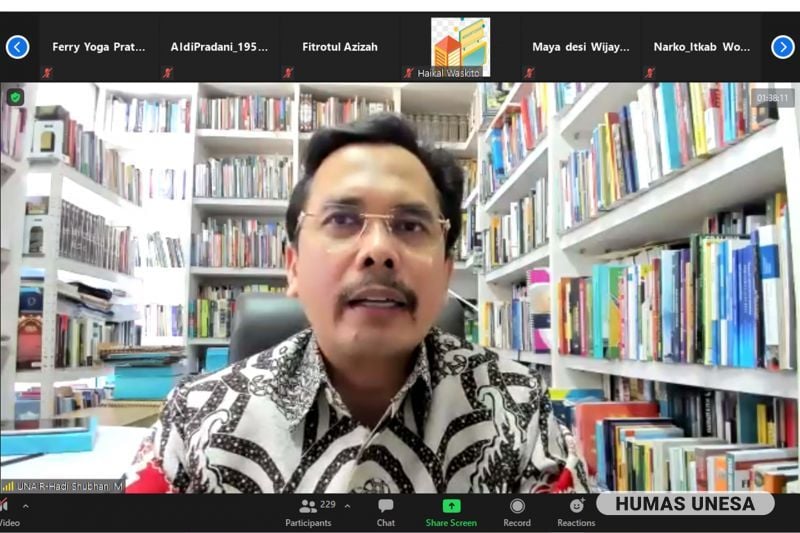
www.unesa.ac.id
Unesa.ac.id, Surabaya-The Job Creation Act, which was passed by the government on October 5, 2020, is still being debated and polemic. The pros and cons still persist. The echo is even more pronounced on the momentum of International Labor Day or May Day on April 1, 2021.
In the midst of the lively issues and "challenges" against the Law on the momentum of May Day, the Unesa Law Student Association (HMJ) did not want to be left behind. They fill International Labor Day by holding a May Day Dialectic forum with the theme "Review of Job Creation Law: Pro People?" on May 1, 2021.
The event, which was held virtually and broadcast live on the Youtube channel, was attended by Arinto Nugroho, S.Pd., SH, MH as the head of the law department of FISH Unesa and Elisabeth Septin Puspoayu, SH, MH, HMJ legal adviser Unesa, and 229 participants from various circles.
As for the speakers, namely Hari Putri Lestari, S.H., M.H. as Member of Commission E DPRD East Java, and Dr. M. Hadi Subhan, S.H., M.H., C.N. as the Bankruptcy and Employment Law Expert, as well as Riden Hatam Aziz., S.H. as President of the Federation of Indonesian Metal Workers Union. In addition, there is also Myra M. Hanartani, Chair of the APINDO Regulatory and Institutional Relations Committee.
As a member of the Provincial Council, Hari Putri Lestari began her presentation with the background and intentions of the government behind the emergence of the Law. He explained that the background of the Job Creation Law was partly due to the factor of employment, based on data in the field, there were around 13 million people who needed employment. Then also the UMKM factor that needs encouragement to transform into a formal one and most importantly the licensing issue which is complex and overlapping.
"We will continue to monitor the performance of the East Java Manpower Office regarding the implementation of the Job Creation Law. If violations are found in the field, or if there are those who have not implemented the policy, of course we will carry out an evaluation and give a warning to the company, "he said. "We are also coordinating with the Governor to create a strong PERGUB to accelerate the performance of these policies at the provincial level," he continued.
Meanwhile, Hadi Subhan explained about "The Law Politics on Job Creation (Plus Minus for Employers and Workers)". According to him, there are several advantages of the Employment Cluster Job Creation Law, one of which is the compensation for PKWT workers which is an advantage for workers and employers.
“Nowadays contract workers get compensation, if in the past they couldn't. We know that the majority of the workers are contracted. Meanwhile, for employers it is not a burden because permanent workers are reduced and will be given to contract workers which is also called fair severance pay, "he explained.
Then, Riden Hatam Aziz discussed the perspective of the Omnibus Law from the side of workers and the general public. According to him, the Job Creation Law does not only discuss labor clusters, so according to workers, Law no. 11 of 2020, the contents degrade the rights of workers.
"At least there are 57 articles that we have submitted to the Constitutional Court, but if they are minimized there are 11 issues including the status of the work relationship, which currently does not have contract restrictions. So, we conclude that in the future employees will become contract employees forever. We strongly reject the regulation in that context, "said Riden. (Esti / zam)
Share It On:






